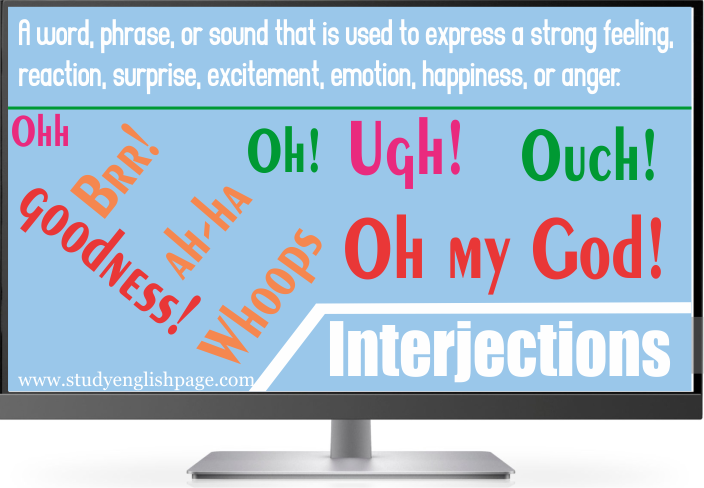Interjections with Examples
Basically, interjections do not have a grammatical relationship with other words and phrases in the surrounding. They are used as interjectors to provide adjunct structure.
Definition of Interjection
An interjection is a word, phrase, or sound that is used to express a strong feeling, reaction, surprise, excitement, emotion, happiness, or anger.
Classes of Interjections
- Primary Interjections
- Secondary Interjections
Primary Interjections
They are single words that are not related to any other word classes. They are not derived from any other word classes. They are used as interjections.
Examples: Hmm, ouch, ow, ugh
- Ouch! I got my finger hurt.
- Ugh! It smells so awful.
Secondary Interjections
Secondary interjections are words that are derived from other word classes or belong to other word classes. We can say that other parts of speech can be used as interjections. They are often exclamatory.
Examples: Oh my God, get out, awesome
- Oh my God! I have not seen such a horrible accident.
- Get our! I don't want to see you here.
Functions of Interjections
Emotion
To express pain = ow, ouch
To express displeasure = Whoops, yuck, boo, ugh, shoot, rats
To express surprise = Gosh, goodness
To express pleasure = Yay, yippee
To express congratulation = Cheers, congratulations
To express commiseration =Oh no, oh well
To express fear = Eek, yikes
Scooby Doo Words
Jeepers, jinkies, yikes, gee, dang, ah-ha, ta-da, zoinks, yoinks
Interjection = Function
Zoinks = surprise, enthusiasm, sympathy
Gee = surprise, enthusiasm, approval, excitement
Dang = displeasure
Drat = displeasure
Gadzooks = surprise, annoyance
Holy smokes = surprise
Non-Emotive
There are some words that we don’t use to express emotion or feeling. We use them for other functions like greeting, response, seeking attention, or introducing a sentence.
- Indeed, he was late once again.
- Yes, I am going there.
- Well, you don’t believe it!
Pressing Pause
These words are used to show a pause in a sentence. We don’t often realize it in speech.
They are um, erm, er.
- I think, um, I should go somewhere else.
Punctuating Interjection
Interjections are followed by different punctuation marks. Three marks follow interjections if an interjection is not a question. The three marks are a comma, a period, and an exclamation mark. An exclamation mark is used for stronger expressions.
An interjection that stands alone precedes an exclamation mark. We use a comma when an interjection introduces a sentence.
Remember that you must use a question mark if the interjection is a question.
- Ohh! That is a beautiful view.
- Brr! It is so hot.
- Well, you don’t believe it!
- Hey. What are you studying now?
Placement of Interjections
Interjections are often used at the beginning of a sentence. They can also be used in the middle or end. In any case, they are used to emphasize or express emotions.
When do we use interjections?
Native speakers use them every day. You may have noticed that a baby’s first word can be an interjection such as ow, ouch, etc. From babies to older ones, everyone uses interjections.
We can use interjections in spoken English, informal writing, books, films, and songs. On the other hand, they are not used in formal writing such as essays, or research papers.
Remember that we avoid using interjections in professional messages, such as business letters, or emails.
EFFORTLESS ENGLISH COURSES
1/ PRONUNCIATION COURSE
Start Improving Your Pronunciation!
In this course, I promise to help you develop an American accent.
I AM EXCITED TO HELP YOU ACHIEVE THE HIGHEST LEVEL OF SUCCESS WITH YOUR ENGLISH SPEAKING! READ MORE
I WANT TO LEARN HOW TO SPEAK WITH AN AMERICAN ACCENT NOW!
JOIN NOW FOR ONLY $49.99
2/ Original English Course












0 Comments